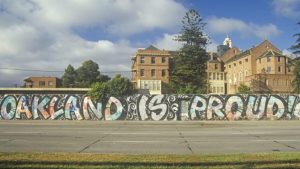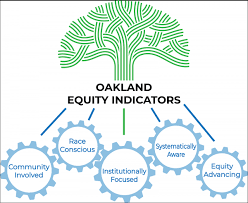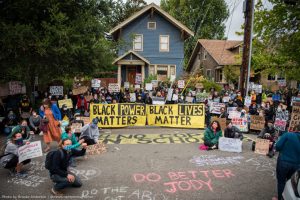2024 All-America City – Oakland, CA

Oakland’s history is marked by a legacy of passionate and skilled activism for racial justice, spanning from indigenous resistance against Spanish missions to contemporary movements like Black Lives Matter, Moms4Housing, and efforts against ICE detention. Despite decades of organizing, many feel that city processes have not sufficiently supported the well-being and inclusion of diverse communities, who continue to face barriers to accessing services and participating meaningfully in civic engagement.
Progress against discrimination has been made, but underlying systems persist. Historic planning and policies harmed racially representative areas, leading to distrust in city government. In response, Oakland established the Department of Race and Equity in 2016 to address racial disparities and foster a vision of diversity and equity. This move acknowledges a need to undo harm and achieve racial equity, reflecting a city grappling with its complex legacy and striving for transformative change toward fairness and inclusion.
Citywide Inclusive Engagement Workgroup
A workgroup initially formed to address City of Oakland employee concerns regarding access to COVID-19 prevention services during the pandemic has evolved into a collaborative space for coordinating outreach and engagement efforts across departments. This initiative aims to enhance the city’s communication and engagement practices with the communities it serves, particularly focusing on those facing barriers to accessing information and services due to limited internet connectivity and device availability.
Over 500 city employees have participated in the workgroup, with 125 currently active members. They have contributed to the creation of a virtual resource catalog, contact lists for community organizations, and training programs to enhance staff skills in engaging with underserved communities. The workgroup successfully advocated for the creation of the city’s first Inclusive Engagement Officer position, which was filled after a rigorous hiring process.
 Furthermore, the workgroup drafted an internal administrative instruction manual to formalize an inclusive approach to the city’s engagement efforts, emphasizing best practices for equitable inclusion and data-driven decision-making. Currently, the workgroup is assisting departments in developing procedures for inclusive outreach and engagement tailored to their respective areas of operation.
Furthermore, the workgroup drafted an internal administrative instruction manual to formalize an inclusive approach to the city’s engagement efforts, emphasizing best practices for equitable inclusion and data-driven decision-making. Currently, the workgroup is assisting departments in developing procedures for inclusive outreach and engagement tailored to their respective areas of operation.
City of Oakland General Plan Update
The Planning and Building Department of Oakland launched an equity change process in 2018, placing a priority on equity within the General Plan Update (GPU). Throughout this initiative, the Racial Equity Analysis Tool and Inclusive Engagement Guide have guided staff in maintaining an equity focus, applying an equity framework, and planning inclusive engagement across various planning areas including transportation, economic development, and housing.
During the GPU development, staff conducted a year-long consultation with community-based organizations serving populations affected by racial disparities. This consultation aimed to build relationships, co-create engagement agreements, and establish guiding principles for the plan. Utilizing virtual meetings, multilingual online surveys, and social media, the city engaged communities effectively.
Community feedback was positive, with residents feeling engaged and listened to by the city. Many community recommendations were incorporated into the visioning process and plan elements. This success was made possible by the internal work of the Inclusive Engagement Workgroup, which prepared the city for collaboration and provided a shared language and framework for inclusive engagement, equity, and equitable outcomes.
Phase 2 of the GPU will focus on updating elements such as Land Use, Transportation, Open Space, and Noise, while introducing a new Infrastructure and Facilities Element. Staff are refining the engagement process for Phase 2 based on stakeholder input, aiming to enhance participation and inclusion in decisions affecting the community.
Capital Improvement Program
In June 2019, Oakland’s City Council adopted the 2020-25 Capital Improvement Program (CIP), which marked a departure from past practices by incorporating community values alongside standard asset-based considerations. This initiative aimed to address racial and social inequities within the city through careful equity analysis in public outreach and project prioritization.
The updated CIP development methodology focused on three main themes: transforming the internal working structure, inclusive and proactive public engagement, and technical considerations such as analytics and project prioritization.
Under the first theme, Oakland made organizational changes and provided staff training on racial equity to lay the groundwork for the CIP update. Two working structures were established to coordinate the transition, ensuring interdepartmental collaboration and approval of proposed changes.
For the second theme, the city devised a comprehensive outreach strategy to engage diverse communities, including intentionally locating meetings in areas with higher proportions of marginalized populations and translating materials into multiple languages.
Finally, technical considerations entailed revising project prioritization criteria to encompass community impact factors like public health and economic vitality. Community members actively participated in refining these factors and assigning their relative importance.
The results of these efforts demonstrated a significant increase in project engagement and implementation in communities of color, showcasing the effectiveness of equity-focused approaches. Oakland’s revised CIP methodology serves as a model for other local governments seeking to integrate equity analysis into their capital planning processes.

Some Related Posts
Thank You to Our Key Partners



